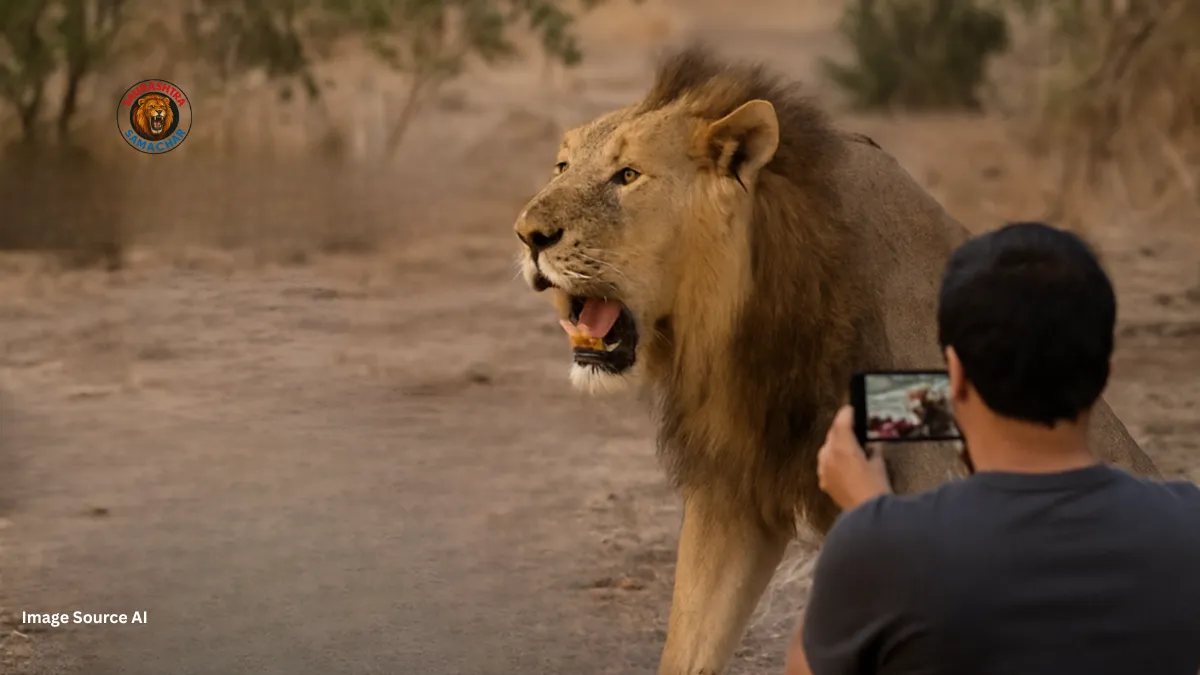In a recent incident that shocked wildlife lovers and conservationists, a man was jailed in Bhavnagar, Gujarat, for harassing a wild lion. This case has sparked serious discussion about human behavior around wild animals and the need to strictly follow wildlife protection laws.
The incident unfolded earlier this week when a disturbing video went viral on social media. The clip showed a man approaching a lion dangerously close while recording it on his mobile phone. The lion was busy feasting on its prey, and as soon as the man entered its space, the animal reacted aggressively. Despite the clear risk, the man continued filming until the lion pounced at him. Background voices in the video reveal other people trying to distract the animal, probably to prevent a serious attack.
The incident took place near Talli village in the Talaja range of Bhavnagar district, an area close to the Shetrunji Wildlife Division, which is home to several protected species including lions. The forest department acted swiftly after the video gained widespread attention online.
Upon launching an investigation, officials identified the man as Gautam Shiyal, a resident of the same area. According to the forest department, he was arrested on August 6, 2025, for violating the Wildlife Protection Act, a law designed to protect endangered and vulnerable species from human interference.
Shiyal was produced before a local court in Talaja town, where his bail plea was rejected, and he was sent to judicial custody. This is a rare but firm example of legal action being taken against individuals who endanger wildlife either for social media fame or out of sheer ignorance.
Why This Incident Matters for Bhavnagar and Beyond
Bhavnagar, a district in Gujarat, is located near Gir Forest and other wildlife sanctuaries, making it a region with rich biodiversity. Lions, especially Asiatic lions, are a protected species and are mostly found in Gujarat. Their population is already under stress due to habitat loss, human interference, and conflicts with local communities.
When individuals like Shiyal recklessly approach wild animals for videos or selfies, they not only put their own lives at risk but also disturb the natural behavior of these animals. A lion perceives any sudden movement or presence in its space as a threat and may react violently—not out of aggression, but instinct.
This kind of behavior can have long-lasting consequences. When wild animals feel threatened repeatedly, they may move away from their habitat, attack humans more frequently, or become disturbed in their eating and mating cycles. This affects the overall balance of the ecosystem.
Wildlife Protection Act and Its Importance
The Wildlife Protection Act of India was introduced in 1972 to provide a legal framework for the protection of endangered species and their habitats. Under this act, it is a punishable offense to harass or harm any protected species, including lions.
By arresting and jailing the man involved in the Bhavnagar lion incident, the forest department has sent out a strong message: wildlife is not a source of entertainment, and violating their safety will have legal consequences.
This incident serves as a reminder that laws are not just for formality—they must be respected. People must understand the role wildlife plays in maintaining ecological balance and why it is our duty to protect them.
Also read: Nandini Village Kolhapur: A Serene Blend of Nature, Culture, and Conservation
Responsible Tourism and Public Awareness
With the rise of social media, many people are now risking their lives and others’ safety just to create viral content. From taking selfies on railway tracks to getting dangerously close to wild animals, these acts are not only foolish but often illegal.
Bhavnagar and its surrounding areas attract tourists who are interested in nature and wildlife. It is essential that both locals and visitors are made aware of wildlife rules and safety measures. Educating the public about respecting boundaries—both legal and natural—can prevent such incidents from happening again.
Tourism authorities, forest departments, and local leaders should collaborate to run regular awareness campaigns, install signboards, and conduct patrols in sensitive wildlife zones.
Also read: Nandani Math Kolhapur: A Spiritual Heritage and Emerging Wildlife Sanctuary Hub
Conclusion
The arrest of a man in Bhavnagar for harassing a lion is not just a legal story—it’s a wake-up call for everyone. We share this planet with many other living beings, and it is our collective responsibility to ensure their protection. Disturbing a wild animal is not bravery—it’s foolishness that could cost lives, both human and animal.
The forests and wildlife of Gujarat, especially Bhavnagar, are precious and must be protected with seriousness. Let this be the last time a lion is harassed for a mobile video, and the first step toward better public understanding of wildlife respect and law.

